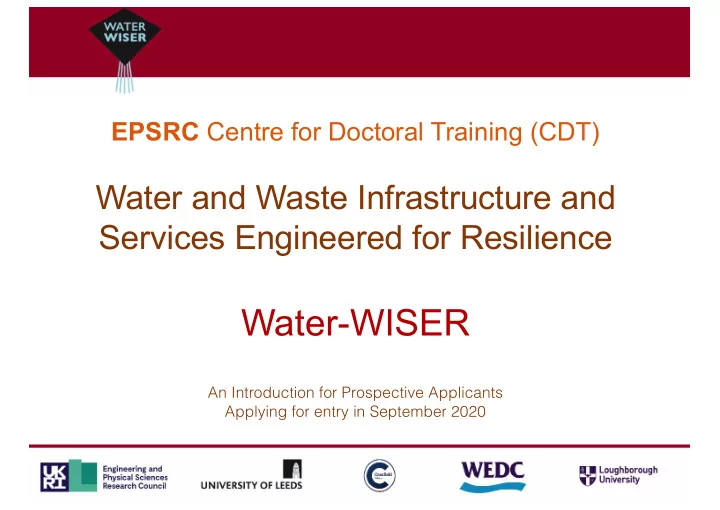

EPSRC Centre for Doctoral Training (CDT) Water and Waste Infrastructure and Services Engineered for Resilience Water-WISER An Introduction for Prospective Applicants Applying for entry in September 2020
Who are we? Barbara Evans Alison Parker Anne Blenkinsopp University of Leeds Cranfield University WEDC Loughborough University b.e.evans@leeds.ac.uk a.parker@cranfield.ac.uk f.a.blenkinsopp@lboro.ac.uk
What is a PhD? • The highest academic degree for which you can study. • 3–4 years of independent research, typically. • Examined by thesis and viva voce examination (two examiners). • Full-time job! • ‘PhD student’ is a misnomer
Why do a PhD? A PhD opens the door internationally to the widest and highest-level employment opportunities in academia, industry, and elsewhere. A PhD demonstrates that you are capable of: • sustained and disciplined effort; • logical thought based on solid evidence, and leaps of insight; • ability to work collaboratively and constructively with other people; • ability to plan resources, schedule your time, deliver to deadlines; • learning from failure, ability to review and refine, and try again; • asking questions, and challenging the status quo ; • pursuing the unknown; • creating new knowledge – potentially creating new products and jobs
What do I need? A PhD is not for everyone (and not everyone is for a PhD). You need to be passionate about your discipline. You need to live and breathe the need to discover more about it. You need to understand the demands that a PhD will place on you (long hours, frustration, competition with international groups etc), and the skills required to be successful … … but, a PhD is a training process, so you have opportunity to develop these skills, in conjunction with your supervisors, as you progress. You need at least a 2:1 degree; stronger applicants have a First.
What is special about a CDT? • Offers a unique training structure and cohort experience. The combination of study and social experiences, recognises that your peers will be your lifelong professional network and contacts; • Fully funded, fees, stipend and research support; • Annual programme includes attendance of sector events, SANCOP, WEDC International Conferences, challenge week, joint study etc; • You benefit from the combined strengths of 3 partner Universities.
What is special - Water WISER? • Integrated PhD programme of transdisciplinary training will develop requisite skills to solve complex problems in global south; • Studentship funding includes provision for up to 6 months in country fieldwork or placement opportunity; • Whilst hosted at a specific centre, you will engage in technical and professional training with cohort peers in partner institutions; • Research will be co-designed with and supported by industry partners and implementing agencies to ensure relevance and impact; • Hosted by three world leading water, sanitation and waste management UK research centres, coordination and management by water@leeds, one of the biggest interdisciplinary research initiatives in the world.
The Centres Three world leading water, sanitation and waste management UK research centres University of Leeds WEDC at Loughborough University Cranfield University
The Centres: Leeds
The Centres: Leeds • Established in 1904, Leeds is a member of the prestigious Russell Group of universities and one of the largest higher education institutions in the UK • School of Civil Engineering has a forty-year track record in public health engineering and WASH • water@leeds is one of the largest trans-disciplinary research groups working on water in Europe • Staff have a wide range of academic and practical experience across multiple disciplines • Current research in – Economics, costing and corruption in sanitation – Green house gas impacts of sanitation – Flood resilience, health and climate in rapidly growing cities • Leeds is a vibrant ‘northern powerhouse’ city (Channel 4 recently relocated here) with a great nightlife, within easy reach of the beautiful Yorkshire countryside • Headingley (International Cricket!), Leeds (Premiership football???)
The Centres: Loughborough
The Centres: Loughborough • WEDC – founded in 1971, WASH focus in low and middle-income country contexts teaching, research and international conference; • 2 MSc programmes are available both in Loughborough and by Distance Learning – Water Management for Development, and Water Engineering for Development – bespoke programme and modules, conversion programme, family of more than 1200 alumni worldwide; • Staff are practitioner scholars with in-country experience, dedicated building, teaching room, outdoor space and laboratories; • Loughborough market town pop. 60,000, 1hour 17mins by train to London, University 2 nd largest campus in Europe, fantastic facilities; Ranked 1 st Globally for sport; a top 5 UK University; consistently 1 st • for student experience, TEF Gold award; • Ongoing research – sustainable rural WASH service delivery in PBR context, gender and lighting in humanitarian settings, real time flood forecasting using big data.
The Centres: Cranfield
The Centres: Cranfield • Active team of resilient infrastructure researchers currently managing large research projects in India, Kenya, Malawi, Ethiopia etc • Research facilities including borehole drilling site and capability to collect and process real human waste • 30 year history of WASH teaching and research • Ongoing research includes: – Sanitation technology innovation – Sand dams for water supply in semi-arid regions – Sanitation at the rural-urban transition – Circular economy for sanitation – Impact of domestic animals on infant hygiene • 40 mins on train to London • Postgraduate only university • World class laboratory and pilot-scale water infrastructure facilities
Activities so far… CDT Induction Event, Leeds – September 2019 Challenge Week in the Peak District National Park – January 2020
The Application Process • Applications through Leeds initially by 31 st January 2020 • Invitations to interviews and assessments will be made by 20th February 2020; • Interviews in Loughborough on 11 th and 12 th March; • Provisional offers made within one week; • Start – an induction event in Cranfield 16/17 September
What you need to do next? • Applications include: academic transcripts; references; statement of motivation which corresponds to the Water WISER scope. • Visits or questions: please contact the presenters b.e.evans@leeds.ac.uk s.tyrrel@cranfield.ac.uk f.a.blenkinsopp@lboro.ac.uk • Apply in good time! www.waterwisercdt.ac.uk
Recommend
More recommend